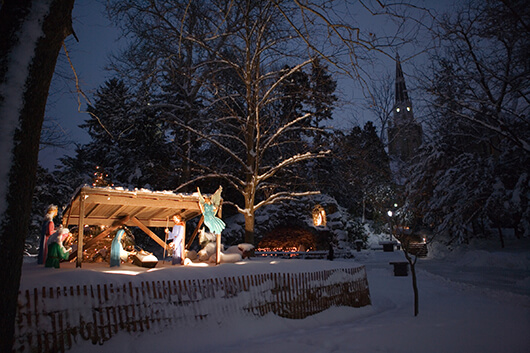For several years now I’ve said that the older I get, the better I look in gray. At first, people chuckle. But I’m very serious about it. I used to worry this meant I was moving to a position where nothing mattered. The truth is quite the opposite: Everything matters, and that’s why things look more gray than black or white.
 Copyright University of Notre Dame
Copyright University of Notre Dame
Let me explain. God is involved in every detail of our life, so everything matters. And if everything matters, then things will necessarily be messy. A messy life means a gray life, not a black and white one.
I keep running across things people say and write that speak to this grayness I see. In a passage about the life of St. Augustine in his excellent New York Times bestseller, The Road to Character, columnist David Brooks quotes Reformed theologian Lewis Smedes: “Our inner lives are not partitioned like day and night, with pure light on one side of us and darkness on the other. Mostly, our souls are shadowed places; we live at the border where our dark sides block our light and throw a shadow over our interior places. . . . We cannot always tell where our light ends and our shadow begins or where our shadow ends and our darkness begins.”
A student in Dillon Hall, where I happily live, writes a quote on his dry-erase board every day. Recently he shared this thought, attributed to Nikola Tesla: “Our virtues and our failings are inseparable, like force and matter. When they separate, man is no more.” So interesting.
Both quotes suggest that life is more gray than black or white. If we are honest about our lives, we see how they are a mixture of day and night, of light and darkness, of virtues and failings, often inextricably bound together. As with a difficult surgery, it may be almost impossible to take something out without damaging something else. Often surgeons opt not to remove a tumor because the danger of damaging something good is so great that it’s better to leave it alone.
In the moral life, we want so badly to eradicate our sins and shortcomings. I often think God must have a reason for allowing me to fail, because he certainly knows that I desire to eradicate sin from my life. He knows I sweat blood trying to do so and yet I still fail. Could it be that in eradicating a certain sin, I might also eradicate a virtue? Or, worse yet, that I would feel proud for having overcome it?
I often tell students in the confessional that, whatever they’re struggling with, God will not act until they’re convinced they can’t do it on their own. At the moment they surrender, he will step in and take care of it. In the meantime, we learn to live in the grayness of life.
In a previous essay, I referred to the parable of the wheat and the weeds in Luke’s Gospel. Workers inform their landowner that an enemy has sewn weeds among the wheat. They ask if they should uproot the weeds. The landowner replies, “No. Wait until harvest time, because at this point you might not be able to tell the wheat from the weeds.” Might we find the same difficulty with telling our light from our darkness, our virtues from our failings?
So we come to Advent. In reflecting on this season of waiting, spiritual author James Finley says that even though there was no room at the inn, “God came anyway. The fact there was no room in the inn did not stop God from being born into this world.”
In our lives filled with clutter and chatter, with unfinished business and rough edges, with smartphones and bitmojis, it often seems we have no room at the inn. We barely keep ahead of the day’s demands and messiness, all of which is necessarily gray. God is not waiting for our lives to be pure light, pure white, pure virtue so he can be born into them. Rather, as Finley says, “God is being born unexplainably in our hearts moment by moment, breath by breath.” We find him in the “interior richness of every little thing that happens to us and everyone around us.”
Why are we so afraid of gray? Why do we strive for black and white when we know things aren’t that way? Maybe it’s because we want to live with certitude. Yet, when certitude lessens the need for faith, it can be a problem.
As I get older the only thing I am sure of — or at least as certain as a person can be in this life — is the mercy of God. No one stands outside of the embrace of God’s mercy. It is available to all of us as we are, where we are, how we are.
Lord, Jesus Christ, Son of the Living God, have mercy on me, a sinner.
Father Joe Corpora, CSC, is the director of the Catholic School Advantage campaign within Notre Dame’s Alliance for Catholic Education (ACE) program and associate director, pastoral care of students, in the Office of Campus Ministry. He is one of 700 priests whom Pope Francis appointed in February 2016 to serve as Missionaries of Mercy and his book of reflections on this experience, The Relentless Mercy of God, was published last spring by Corby Books.